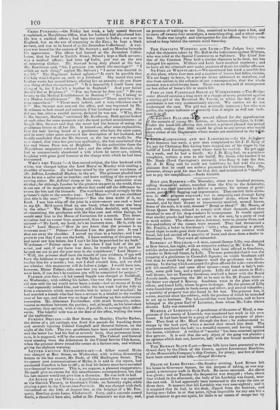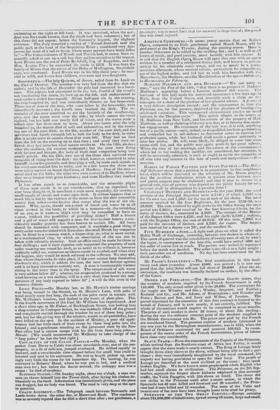DEATH OF Lonn RivEns.—On Sunday evening, Lord Rivers left his
house in Grosvenor Square, for the purpose of taking, as was sup- posed, a customary walk in Hyde Park. He never returned. An alarm was given ; and on Tuesday the Serpentine was dragged ; when, about four o'clock in the afternoon, the body of his Lordship was found, near the east end. It had apparently been immersed in the water for two or three days. . It appears that his Lordship was very near-sighted; and it is supposed that he had, in the dusk, slipped from the footwey, and having once fallen in at that point, itwas impossible for any one but a good swimmer to get out again, for there is no means of escape but by
swimming to the right or left bank. It was surmised, when the ace-
• dent was first made known, that the death had been voluntary; but of this there did hot appear, before the Coroner's inquest, the slightest evidence. The Jury returned a verdict of "Found drowned near the public path at the head of the Serpentine River ; considered very dan- gerous for want of a rail or fence, where many persons have lately fallen in."—The Commissioners of Woods and Forests had,-it seems, been re- peatedly asked to put up a rail, but they paid no attention to the request. Lord Rivers wasthe son of Peter. Beckford, Esq. of Stapylton, and the Hon. Louisa Pitt : he succeeded his uncle in 1828.. It was from the family of Rivers that the estne of the Duke of Wellington, Strathfield- saye, was purchased. Lord Rivers was in his fifty-third year : he mar- ried in 1808, and leaves four children, two sons and two daughters.
SHIPWRECL—The brig Quixote, of Jersey, sailed from St. Lucie on the 23rd of October. The weather was very bad from the day that she
sailed ; zind hy the 5th of December the gale had increased to a hurri- cane. The czmtain had attempted to lie to ; but, fearful of the vessel's not weathering the storm, he bore up on the 5th, and endeavoured to scud under a 'reefed fore-topsail: About half-past six in the evening, the brig broached to. and was immediately thrown on her beam-ends. Three out of four of the men, who were below in the fore-cuddy, were immediately drowned ; the fourth man ' 'reached the deck. The re- mainder of the crew contrived to cut the laniards of the weather-rig- ging, and the masts went over the side ; by which means the vessel righted, but her hold was nearly full of water, and the waves made a
Infach over her from stem to stern. About two hours after the brig broiselled to, the master died of cold and exhaustion-, and in the morn-
ing one of the crew died ; on the 9th, another of the crew died, and the survivors had barely strength left to lash the body to the deck, in order that it might serve to sustain those that were left. • They had no food from the 5th on the evening up to that time ; and until they were re- lieved; they had none but what nature revolts 'at. On the 12th, six das after the accident, the weather moderated ; but the crew were • dying with fatigue and hunger. the body of their dead companion, being now
-neatly putrid. On the 13th, two out of the three, that survived were
incapable of rising from the deck: the third, however, contrived to raise himself :ffioye the gunwale, and descrying a sail, he Made such signals as his weakness enabled him to make, and in a few hours the three men were safely carried on board the Ceres, of Harfleur. One of, the men so saved died on the 15th; the other two were conYeyed to Harfleur, where they were treated with great kindness ; and fromAlarfleur they reached Plymouth.
It has often struck us as remarkable, and the miserable plight of these men rends it to our consideration, that ,no expedient has ever' been- thought of, in merchant vcssels more especially, for stowing a small-supply of biscuit and water upon deck. It seldom happens that so much life is lost by the violence of the storm as from the slow irresistible
enemy that follows—the famine that comes after the war of the de- ments. Why, again, should not a stock of bread and water be at all times szenimd in the boats, to which in a moment—in the twinkling
of an eye, as it were—a ship's crew may be compelled to have re- Course, without the possibility of providing either ? Half a biscuit and a gill of water will support a man for twenty-four hours ; a con- siderably. smaller quantity has been known to sustain life. All boats sheuld be furnished with compasses, nd it wouldebe a good thing if every sailor were furnished with them also: the small Dutch toy compasses can be fitted to n common watch' a finger-ring, or, what is more useful, to'a mathematical ring, by which an observation of the sum can be taken with tolerable accuracy. Such an affair could be made for three or four shillings; and if their captains only suggested the propriety of each sailor wearing one round his neck, so as never to be without it, however suddenly called on, numerous accidents would be avoided; and when they did happen, they would be much softened to the sufferers. We may add, that where shipwrecks do take place, if the crew cannot keep themselves absolutely dry, which is seldom the case, the next best defence against cold is to keep themselves entirely wet. A man is incomparably warmer sitting in the water than in the spray. The temperature of salt water is very seldom below 450; whereas the evaporation produced by a strong wind blowing on a wet surface, will in a very short time lower the tem- perature of any body exposed to below 320 ; it will do this even in the warmest climate.
LONG POLES.—On Monday last, as Mr. Martin's timber carriage was being turned in the Strand, up St. Martin's Lane, with poles of wood nearly sixty feet long, the ends of the poles came in contact with Mr. Williams's window, and dashed in the front, of plate glass. This is the fourth occurrence of the kind Mr. Williams has experienced. And a short time ago, as Mr. Fisher, of Buckingham Street, was looking into a shop-window in Cockspur Street, he was suddenly lifted off the ground and completely carried through the window by one of these long poles ; and, but for the giving way of the Window, would, in all probability, have been killed on the spot. In the accident of Monday, a poor old apple. woman had her little stock of fruit swept by these fong poles into the kennel ; and a gentleman standing on the pavement close by the New Post-office had a narrow escape with his life from these long poles.— Herald. • [We would recommend Mr. Wellesley to take charge of the "long poles;" he has the best right.) CASUALTIES OF THE CALMS PesseuE.—On Monday, when the packet from Dover to Calais was about two-thirds over, one of the pas- sengers' in a fit of delirium, jumped overboard. He drifted rapidly to leeward, and a considerable time elapsed before the small boat could be lowered and sent to his assistance. He was at length picked up, seem- ingly' very little the worse for his hazardous dip. On landing, he was conveyed to Robarts' Hotel, where he was put to bed, and a medical man sent for ; but before the doctor arrived, the unhappy man was a corpse : he died of apoplexy.
SUPPOSED Suicums.—On Sunday night, about ten o'clock, a man was seen [to throw himself into the Tower ditch, after laying his clothes de- liberately on the bank. Information was immediatelygiven, and the place was dragged, but no body was found. The mud is very deep at the spot in question.
• COACH Acerpasex.e--The Telegraph coach between Newcastle and Leeds broke down the other day, at Harewood Bank. The coachman was so severely injured that he died a short time after; one gentleman, a
passenger, n-as so much hurt that his recevecy is despaired of; the guard also was much injured.



























 Previous page
Previous page